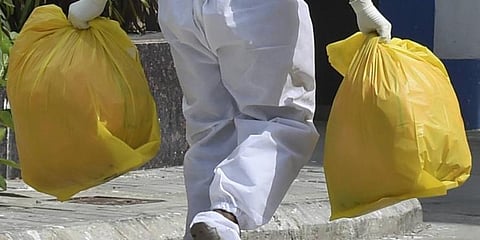

In March 2021, Congress lawmaker Amme Yajnik demanded that the government take measures for better disposal of bio-medical waste, citing mishandling by the municipal agencies. On Wednesday, with India reaching the 3 lakh daily case count, the waste situation remains the same, according to Suneel Pandey, Director, Environment and Waste Management Division, The Energy and Resources Institute. “CPCB has given guidelines to discard the biomedical waste generated in Covid camps, and Covid-related material such as gloves and masks in households.
But local bodies are not equipped to handle biomedical waste, and even the public doesn’t have enough knowledge about segregating it.” In December 2020, the daily average quantity of biomedical waste (BMW) generated in the country was estimated to be 146 tonnes per day (TPD). In the same month, Delhi generated 321 TPD of BMW. And now that cases have skyrocketed, the load on the two government Common Bio-Medical Treatment Facilities would have automatically increased.
“There is nobody taking leadership on health issues in this country,” observes Environmentalist Jai Dhar Gupta, adding, “People need to be told how to dispose of waste if they are Covid positive. I feel the government should ideally run advertisements in the papers to sensitise people about segregating biomedical waste. By not doing this, we are putting all sanitation workers at risk.” Ishani Sonak, Research Associate, who works on Municipal Solid Waste at CSE, shares that as per the guidelines, the municipality has to be closely involved in collecting biomedical waste generated from Covidpositive houses.
“But through my interaction with these workers I realised that this practice is only on paper. Even during the first wave this was not done. Also, Covid positive people don’t want to give their waste separately because of the social stigma when they have to declare their case,” she adds. Pandey proposes that the waste collection vehicles should make announcements on how people should segregate their Covid related waste in yellow bags, instead of playing Swachh Bharat jingles.
Gupta notes that PPE kits syringes, gloves and other such items would take thousands of years to biodegrade, and will release tonnes of microplastics into our environment. Delhi has only two Common Biomedical Waste Treatment Facilities (CBWTF) at Nilothi and Industrial Area. As per the information available on the Delhi government’s Health and Family Welfare website, the Nilothi CBWTF has two incinerators with a capacity of treating 250 kg per hour each and the one in Industrial Area has a capacity to treat 25,000kg per day. Last week, Aam Aadmi Party (AAP) also alleged that the BJPled municipal corporations of Delhi (MCDs) were failing in the collection and disposal of medical waste from the residences of home-isolated Covid- 19 patients.
Much Wastage at Hospitals
Experts even said that a lot of hospitals either don’t know or are not following the due procedure to manage biomedical waste. “Quantity of waste being generated right now is obscenely high. Biomedical waste has not gone up by 100 times but 1000 times, and our system is not upgraded to handle this waste,” adds Gupta. As per an expert, till 2011, some hospitals in Delhi used to have their own incinerators but they were phased out because it was not environmentally a safe idea, as the treatment plants need to be outside the city.
A biomedical waste expert, requesting anonymity, said that the increase in the waste generation is due to PPE kits being used in large numbers. “Waste management won’t be an issue for health care facilities that have an already existing dedicated biomedical waste management (BMWM) infrastructure, dedicated BMW sanitation workers, and linkage to common biomedical waste management treatment facilities under BMWM Rules 2016.
But if a school is turned into a Covid centre, waste management will be a problem.” Sonak, who was the coordinator at a training programme on biomedical waste management that happened in January, says, “We had several doctors in the programme, and after talking to them we realised that staff and doctors don’t know how to segregate the waste. And that’s a huge problem because every item goes through a different procedure. While needles are buried underground inside an HDB liner, the PPE kits are incinerated. So, the first step is to have proper segregation in place even before having enough capacity to treat them.”
IN A NUTSHELL